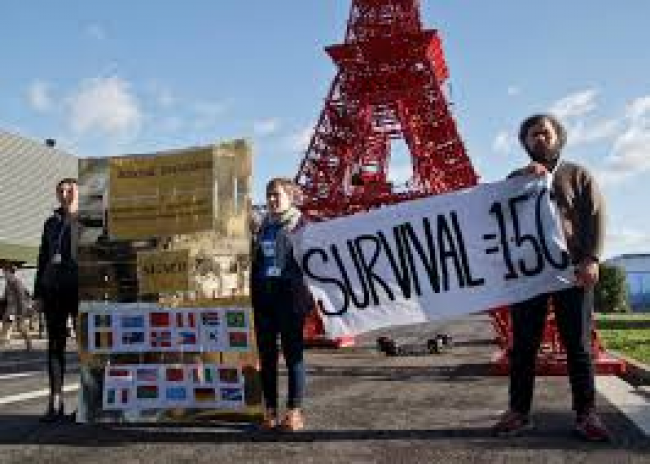Articles Menu

On Sunday, Environment Minister Catherine McKenna announced that Canada would support over 50 small island states and vulnerable nations calling for a new limit of 1.5C of warming to be enshrined in the Paris climate agreement.
If McKenna and the rest of Justin Trudeau’s government mean what they say about supporting this ambitious target, it’s time to rattle off the good news: Energy East is dead, the twinning of Kinder Morgan’s Trans Mountain pipeline is history, the vast majority of the tar sands will be left in the ground, and Canada is about to begin decarbonizing its economy at a heroic and unprecedented rate.
We may be in Paris, but hold the champagne.
The science is clear: it would require nothing short of a miracle to curb the frighteningly rapid rise of global temperatures at 1.5C above historic levels. With 2015 on track to becoming the warmest year on record, it was reported for the first time last month that global average temperatures have already risen by 1C, leaving only half a degree of warming left until we reach the 1.5C limit. That means we have a lot — some would say an impossible amount — to do to decarbonize over the next few decades.
Deciding which path to take and getting there in time presents an incredible challenge, but the science is simple: the 1.5C target that Canada has pledged to respect represents a physical limit on the greenhouse gases the world can afford to produce. Based on the previously internationally agreed upon target of 2C, the amount of emissions was translated into a global carbon budget of 1 million metric tonnes. Canada’s piece of that global carbon pie, assuming its share of global emissions remains the same, is approximately 14 gigatonnes.
In order not to exceed its share of the carbon budget, Canada must rapidly decarbonize its economy. The world economy must decrease its carbon intensity, the amount of carbon emitted per unit of GDP, by 6.3 per cent each year to remain within the 2C limit, and this rate would need to be even higher if a target of 1.5C is adopted. Canada, in line with the world average, is currently reducing the carbon intensity of its economy by a mere 1.3 per cent annually, far from what it would take to reach even the 2C goal.
Such a transition would unquestionably be a bold departure from business as usual. If the Canadian government is serious about its commitment to 1.5C, it must end new development in Alberta’s tar sands, one of the most carbon-intensive oil sources in the world. (Canadian scientists have already explicitly called for this.) The science says that we need to keep 85 per cent of known tar sands reserves in the ground to stay in line with 2C, and even more to limit warming to 1.5C. Transcanada’s Energy East pipeline, which would single-handedly carry enough oil to burn through Canada’s carbon budget in less than two decades, is undoubtedly off the table.
However, this transition would not just be about saying no to fossil fuels; it would be an unprecedented opportunity to build a more just economy that works for people and the planet — one that provides a just transition for workers in the fossil fuel sector, invests in public transit and more livable cities, improves public health and air quality, and spurs massive jobs growth in renewable energy and low-carbon sectors.
One of the first things Trudeau did in office was unmuzzle Canadian scientists, and the time has come for him to listen to those scientists. If the Liberal government is going to endorse the 1.5C target, it cannot do so just as a rhetorical tool to bolster its credibility on climate. It must respect the science behind it, the concrete, physical realities that the number unequivocally represents.
Trudeau is still working with the provinces to form the Liberals’ final climate plan, and he can decide to to respect the science of 1.5C that is nothing short of historic. Indeed, the disruption of many millions of lives hangs in the difference between 1.5 and 2C. Canada has an opportunity to be a world leader in a just transition that respects those lives.
[End of post]